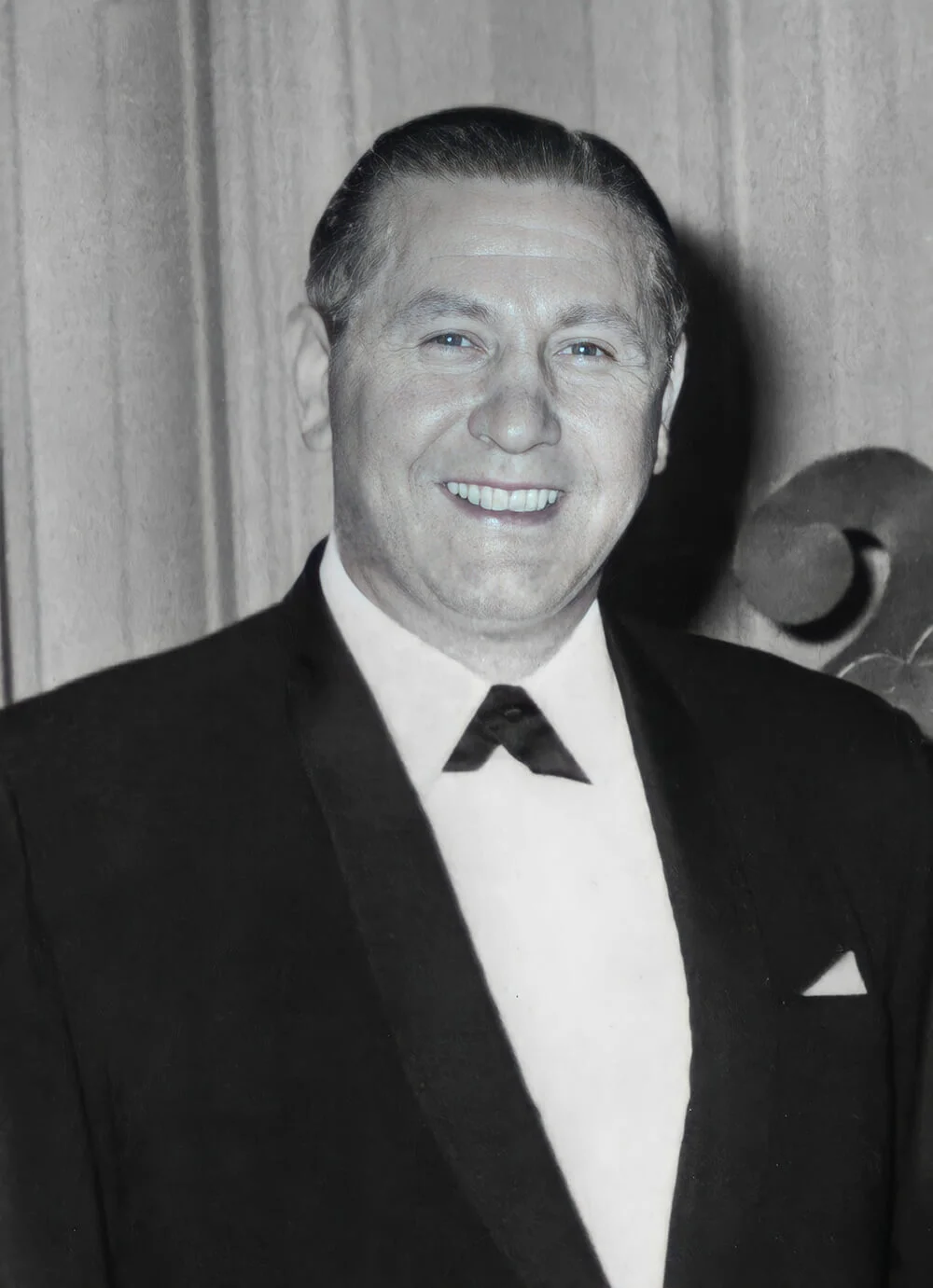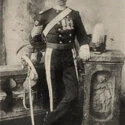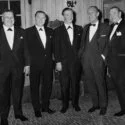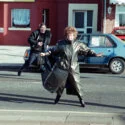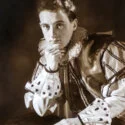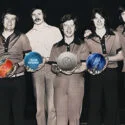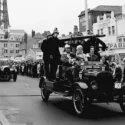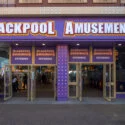Stanley Harding Mortensen (26 May 1921 – 22 May 1991) was a distinguished English professional footballer, best remembered for his remarkable performance in the 1953 FA Cup final, commonly referred to as the “Matthews Final.” During this match, he made history by becoming the only player to score a hat-trick in a Wembley FA Cup final. Mortensen was also the first player to score for England in a FIFA World Cup qualifying match and later became the first England player to find the net in the World Cup itself.
Wartime career
Born in South Shields, Mortensen enlisted in the armed forces in 1939 as a teenage wireless operator. He faced significant adversity when he was the sole survivor of an RAF bomber crash, an injury that did not prevent him from being signed by Blackpool Football Club in 1941. While stationed at RAF Lossiemouth in Scotland, Mortensen scored 13 goals in 12 unofficial matches for Aberdeen and also played as a guest for Arsenal, with an impressive record of 25 goals in 19 appearances.
Throughout the war, he found the net countless times, but one particular event would remain a peculiar chapter in his career. During a match on 25 September 1943, he unexpectedly found himself playing for Wales. After Wales’ Ivor Powell was injured and had to leave the pitch, Mortensen, serving as England’s reserve, was asked to take his place in the Welsh team. Wales were defeated 8–3, and Stanley Matthews later recalled the confusion surrounding the event: “The 80,000-strong crowd had no idea that Mortensen was about to switch sides. When, a quarter of an hour later, the player in the red jersey reappeared on the field, the crowd assumed Powell had returned, unaware of the seriousness of his injury. Even when ‘Powell’ moved to the inside-left position, no one suspected anything out of the ordinary, as changes are often made due to injuries. Some of the England players were also unaware that Mortensen was now playing for Wales, and the football reporters, whose base was in the upper stand at Wembley, did not learn of the change until after half-time.”
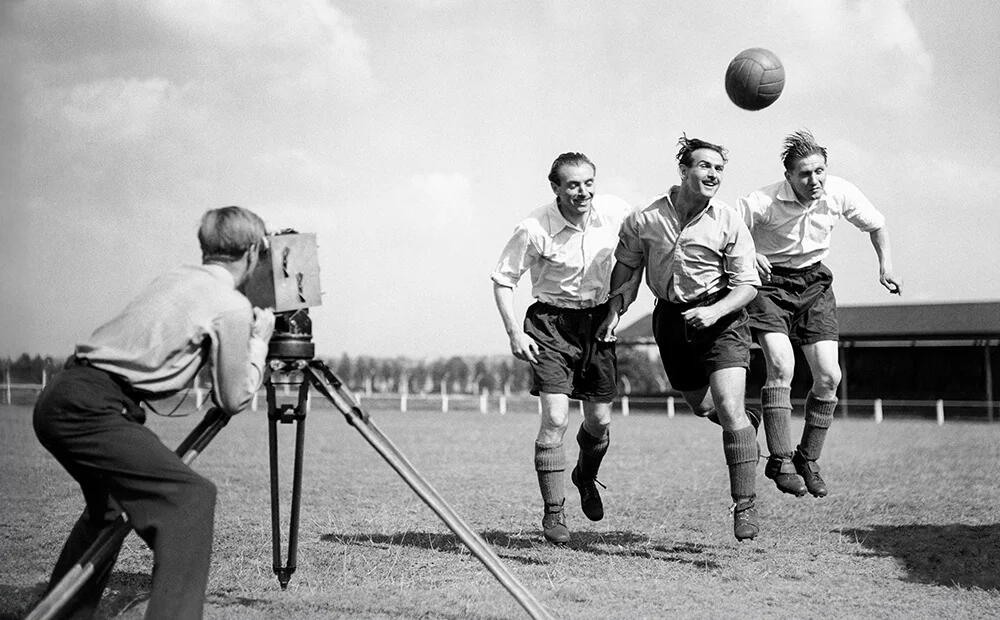
Famous football internationals (l-r) Stanley Matthews, Stanley Mortensen (Blackpool) and George Hardwick (Middlesbrough) taking part in an instructional film being made by the Football Association, at Hendon. 17 September 1947
Post-war club career
Most of Mortensen’s playing career was spent at Blackpool FC, where he made a significant mark by scoring 197 league goals in 317 appearances. His total of 197 goals, all in the top flight, places him as the 33rd-highest goalscorer in English football history. He is also Blackpool’s second-highest goalscorer, trailing only Jimmy Hampson.
Mortensen set a remarkable record by scoring in 15 consecutive league matches, a feat that still stands today. Another of his enduring records is his achievement of scoring in twelve successive rounds of the FA Cup, including the 1948 FA Cup final defeat. In the semi-final of the 1947-48 competition, with Tottenham Hotspur leading 1-0 and just four minutes remaining, Mortensen equalised from a cross by Stanley Matthews. He went on to score two more goals in extra time, helping Blackpool secure a place in the final for the first time. Mortensen had scored seven goals across all rounds, and in the final, Blackpool initially took the lead through a penalty against Manchester United. However, Jack Rowley equalised before Mortensen restored Blackpool’s advantage just before half-time. Despite Mortensen’s efforts, Rowley netted again, and two late goals sealed a 4-2 victory for United. Mortensen became the first player to score in every round of the FA Cup in one season.
Blackpool returned to Wembley for the 1951 FA Cup final. Mortensen had netted five goals during the tournament, but his efforts were not enough as Blackpool were once again defeated. A second-half brace from Jackie Milburn gave Newcastle United a 2-0 win. It was in the 1952-53 season that Mortensen and Blackpool finally triumphed in the FA Cup. Although the final is famously known as the “Matthews Final,” Mortensen’s performance ensured his place in history.
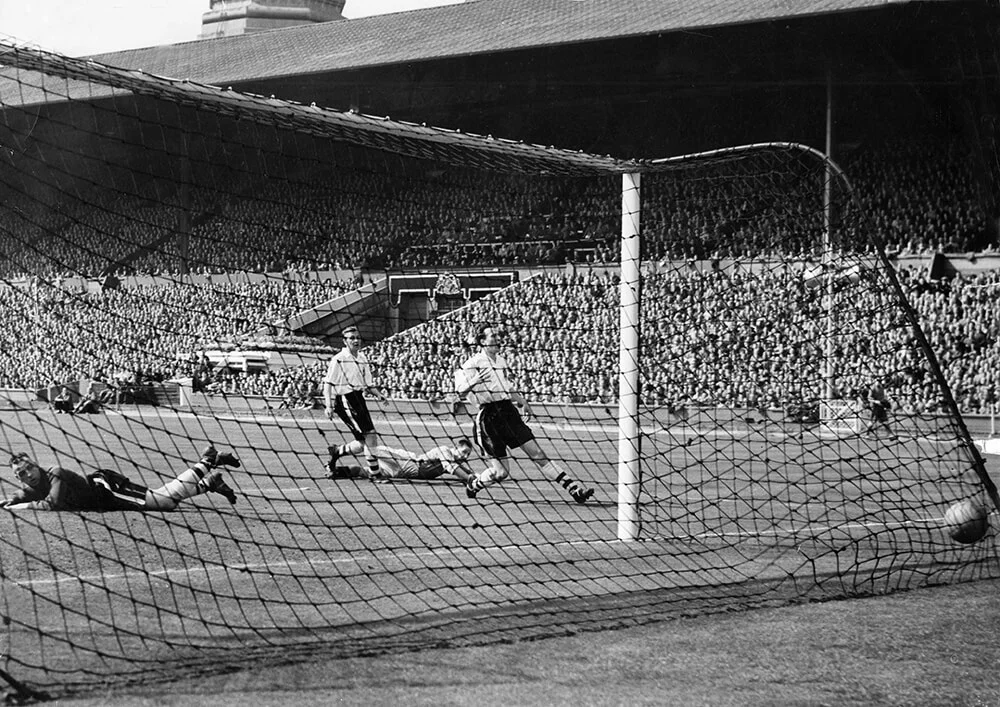
1953 FA Cup Final Bolton Wanderers v Blackpool. Stanley Mortensen scores the equaliser for Blackpool during the FA Cup Final at Wembley. The ball deflected off of Hassall and into the net. 2nd May 1953
A 2–1 victory over Tottenham took Blackpool to their third Wembley final, where they faced Bolton Wanderers. Bolton took an early lead with a second-minute goal from Nat Lofthouse, but Mortensen soon equalised when his shot was deflected in. Bolton then regained the lead, making it 3–1, but Matthews set up Mortensen to reduce the deficit to 3–2. In the final moments, with just two minutes remaining, Mortensen scored a 20-yard free-kick to level the score at 3–3, becoming the first player to score a hat-trick in an FA Cup final at Wembley. In injury time, Bill Perry converted a Matthews cross to give Blackpool a 4–3 victory. Mortensen’s hat-trick was not initially recognised as such; his first goal was widely considered an own goal by Harold Hassell at the time. BBC commentator Kenneth Wolstenholme and the Sunday newspapers both credited the goal to Hassell. It wasn’t until the FA Yearbook was published two months later, confirming Mortensen as the scorer of all three goals, that the hat-trick was officially acknowledged.
In the Charity Shield match at Highbury against Arsenal, Mortensen put Blackpool ahead, but Arsenal came back to win 3–1 with goals from Tommy Lawton and a brace from Doug Lishman. The 1950–51 league season saw Mortensen set a new record for the most consecutive matches scored in, breaking the previous record held by Jimmy Dunne. Despite missing two matches due to injury, Mortensen scored in 15 consecutive games, and even after a blank, he finished with 16 goals in 17 appearances. From December onwards, he netted 25 goals in 22 matches, finishing the season with 30 league goals. Mortensen was the top scorer for Blackpool in every season he played for the club.
After ten seasons with Blackpool, Mortensen was transferred to Second Division Hull City. He later joined Southport, and on 24 April 1958, at the age of 37, he announced his retirement from professional football due to ongoing knee trouble, despite having received several injections. “Making the decision was not easy,” he said, explaining his decision not to renew his contract. However, he continued to play for non-League clubs Bath City and Lancaster City after his retirement.
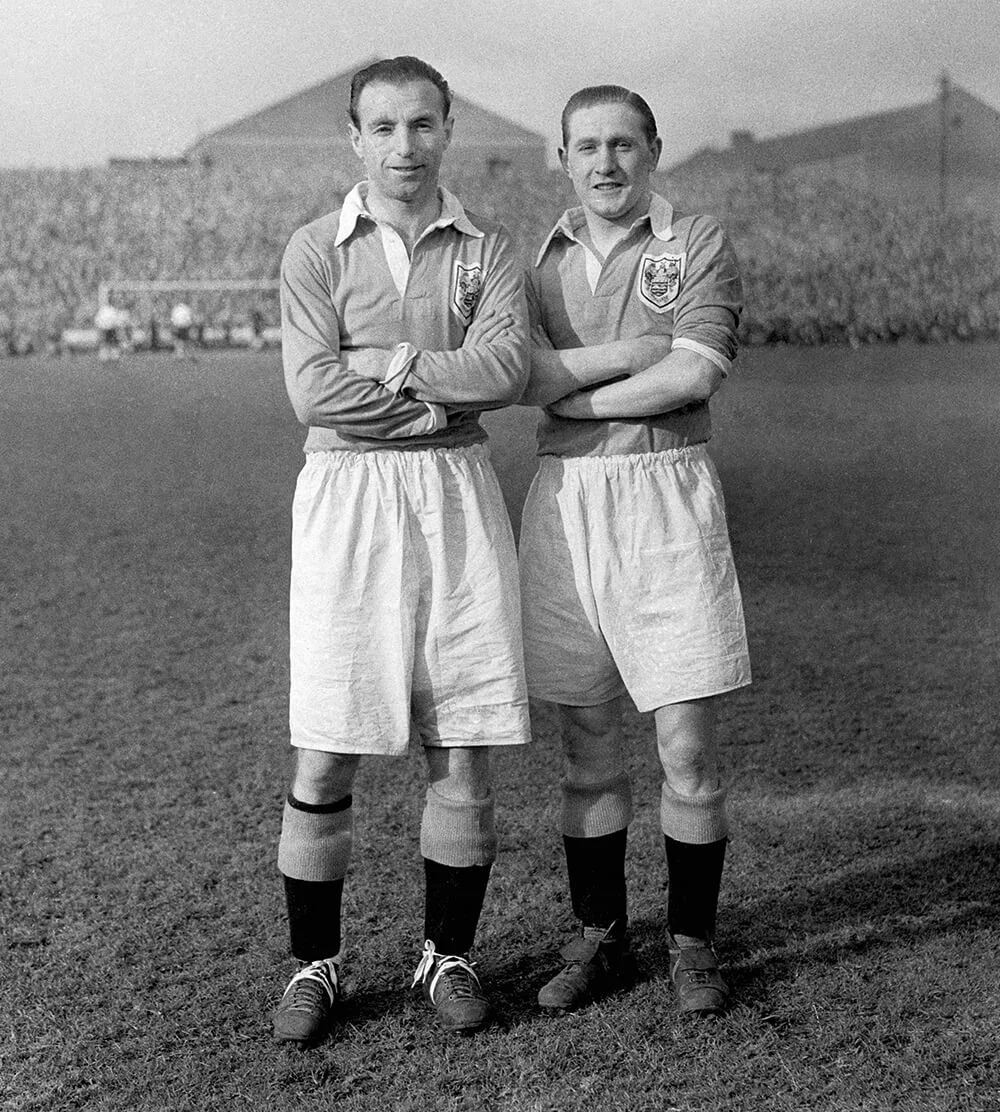
(L-R) Stanley Matthews and Stan Mortensen, Blackpool – 28 February 1948 © Alamy
International career
Mortensen earned his first international cap for England on 25 May 1947 in a friendly against Portugal, where he made an immediate impact by scoring four goals in a 10–0 victory. His first competitive match came later that year in October, during a British Home Championship match against Wales at Ninian Park. Mortensen found the net again as England won 3–0. The following month, in another friendly against Sweden at Highbury, Mortensen completed a hat-trick in a 4–2 win.
In 1948, Mortensen scored yet another hat-trick, this time in a British Home Championship match against Ireland at Windsor Park in Belfast, where England triumphed 6–2. On 25 June 1950, he etched his name in World Cup history by scoring England’s first-ever goal in a World Cup tournament, helping England to a 2–0 victory over Chile at the Maracanã Stadium in Rio de Janeiro, Brazil. Mortensen earned his final international cap for England on 25 November 1953 in the famous “Match of the Century” against Hungary. England’s long unbeaten home record against foreign teams came to an end in a 6–3 defeat, with Mortensen scoring one of England’s goals before half-time after they had fallen 4–1 behind. Over the course of his international career, Mortensen scored 23 goals in 25 appearances, though his progress was hampered by a series of knee injuries. Additionally, he was eligible to play for Norway due to his grandfather, Hans, who had emigrated to South Shields.
Post-retirement
After retiring from playing, Mortensen returned to Blackpool as manager from 1967 to 1969, but his tenure ended with his dismissal. During a difficult period for the club, he auctioned off his football medals to help Blackpool through financial troubles. On 20 October 1983, Mortensen was voted vice-president at the club’s annual supporters’ general meeting. On 18 November 1989, Mortensen made a memorable return to the Bloomfield Road pitch when he led the Blackpool team out for their FA Cup first-round match against Bolton Wanderers. On the opposite side, former Bolton forward Nat Lofthouse, who had faced Mortensen and Blackpool in the 1953 FA Cup final, led the visitors onto the field. Just twelve days later, on 30 November, a tribute dinner in Mortensen’s honour was held at the Savoy Hotel in Blackpool. The event, attended by many former Blackpool players, celebrated his fifty years of service to the club and the town. Mortensen remained a beloved figure in Blackpool, frequently appearing at local promotional events, including an appearance at a Tudor Bingo event.
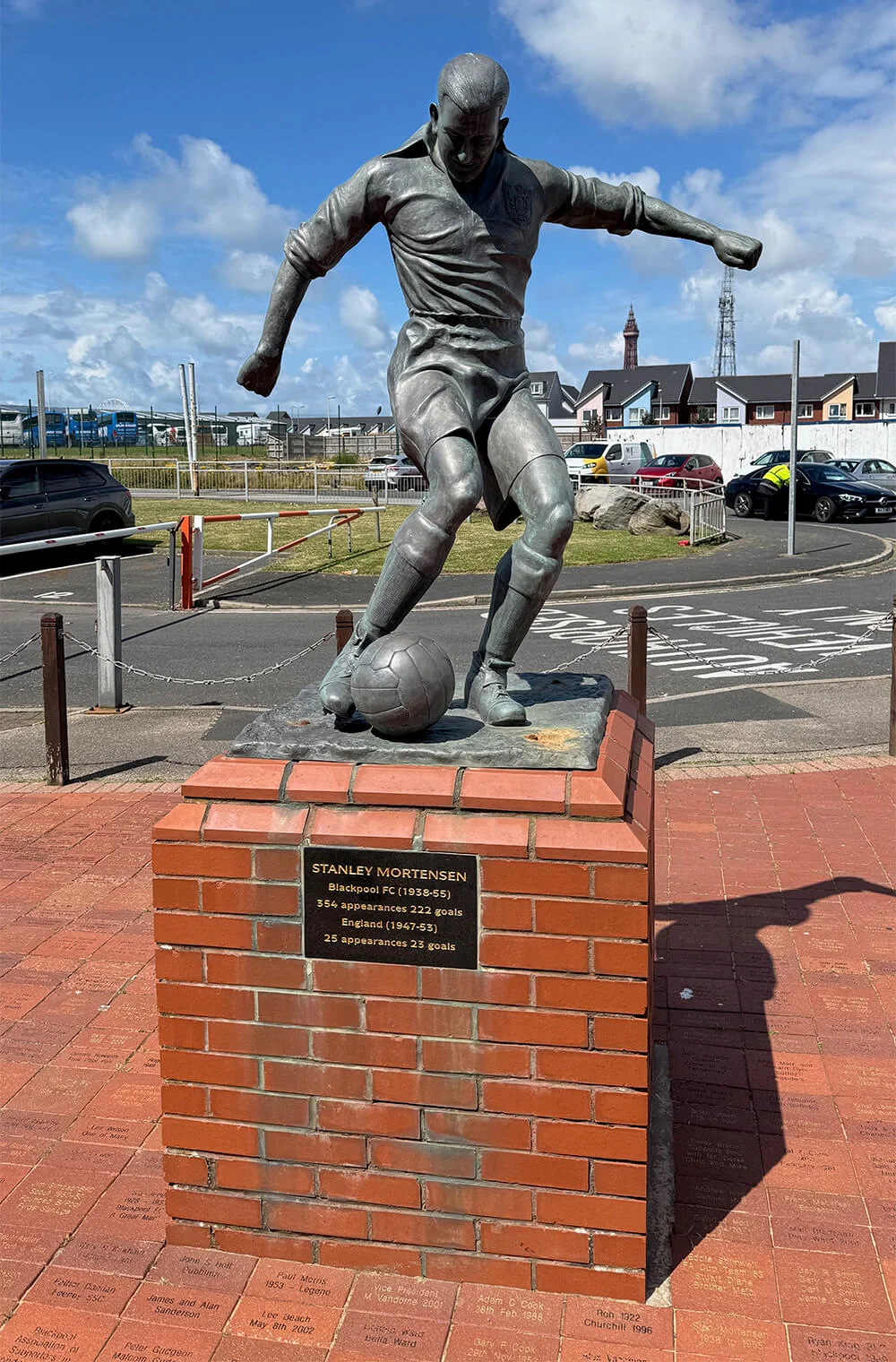
Seasider53 – CC BY 4.0 – 27 July 2024
Statue outside Bloomfield Road
Mortensen passed away on 22 May 1991, at the age of 69, the same day that Blackpool reached Wembley for the first time since 1953. The club had secured a 3–2 aggregate victory over Scunthorpe United to reach the Fourth Division play-off final. A minute’s silence was observed before their match against Torquay United in tribute to him. Following his death, it was said, “They’ll probably call it the Matthews funeral,” referencing the overshadowing of Mortensen by Stanley Matthews after the 1953 FA Cup final. Mortensen’s funeral was held at St John’s parish church in Blackpool, and he was cremated at Carleton Crematorium in Carleton, Lancashire. May became deeply associated with his life, as it was the month of his birth, his professional signing, his England debut, his FA Cup victory, and his death.
Mortensen is also honoured in the song “1966 and All That” by indie band Half Man Half Biscuit, who refer to him as “The Tangerine Wizard” and “The Jesus Christ of Bloomfield Road.” In 2003, he was posthumously inducted into the English Football Hall of Fame, recognising his immense talent and achievements. On 23 August 2005, a statue of Mortensen was unveiled outside Bloomfield Road’s new North Stand, which was named in his honour. The statue was unveiled by Mortensen’s widow, Jean, and his former Blackpool teammate, Jimmy Armfield. Jean Mortensen later reflected, “Of all the honours that Stan won in football, he would think this was top of the league. He was so very proud of playing for Blackpool and loved everything about the town. Nothing was ever too much trouble for him when the club or town came knocking. For him to be remembered in a statue, he would think it was the creme de la creme. A massive thank-you has to go to the generous people of Blackpool, who have dug deep to raise money for this. Stan would have been really proud.” Jean passed away in July 2009 at the age of 88.
In the 2005 film The Game of Their Lives, Mortensen was portrayed by Gavin Rossdale, of the band Bush. The BBC pointed out that viewers might find it amusing that Mortensen, a working-class Geordie, was portrayed as a “sneering toff,” suggesting that the film took liberties with the portrayal of English players in a stereotypical and clichéd way.
Blackpool F.C. Hall of Fame
Mortensen was inducted into the Hall of Fame at Bloomfield Road during its official opening by Jimmy Armfield in April 2006. The event, organised by the Blackpool Supporters Association, involved fans from around the world voting for their all-time heroes. Five players from each decade were chosen for induction, and Mortensen was honoured as part of the 1950s cohort.
